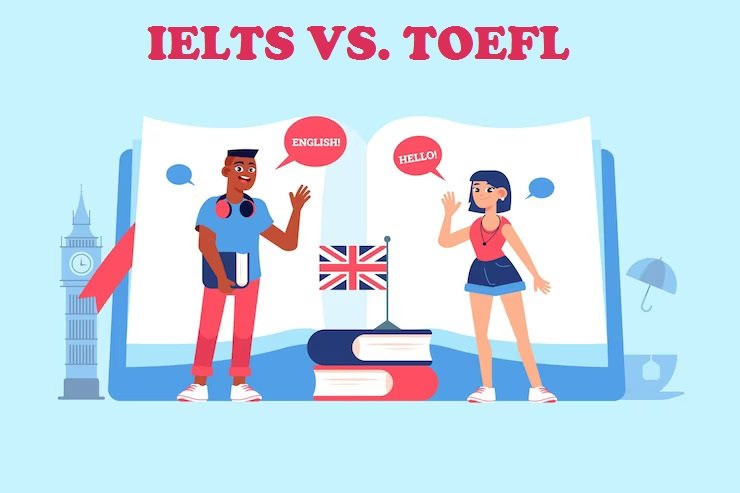Studying in a foreign country can be a thrilling experience, but it's important for applicants to be well-informed about the application process beforehand. Several factors need to be taken care of, including choosing the appropriate college, language tests, and country, among others. One of the most important factors is demonstrating proficiency in the English language, which is mandatory for studying in an English-speaking country.
When it comes to assessing students' English language proficiency for studying abroad, both IELTS and TOEFL are commonly used. While they serve the same purpose, they have distinct features that set them apart. To comprehend these disparities, it's essential to have a clear understanding of each test separately which is why we are providing you with relevant information to help you make the right decision-
What is IELTS?
The International English Language Testing System, or IELTS, is a standardized test used to measure the proficiency of non-native English speakers in the language. It is accepted by over 10,000 organizations worldwide, including universities, immigration authorities, and employers. The test consists of four sections: listening, reading, writing, and speaking, with a total duration of 2 hours and 45 minutes. IELTS assesses a test-taker's ability to communicate in English in a variety of real-life situations, and scores are given on a scale from 1 to 9, with 9 being the highest score. Preparing for the IELTS test requires practice and familiarity with the test format and question types, and many resources are available to help test-takers achieve their desired scores.
What is TOEFL?
The Test of English as a Foreign Language, or TOEFL, is a standardized test used to measure the English language proficiency of non-native speakers who wish to study or work in English-speaking countries. The test assesses a test-taker's ability to understand and use English in academic and professional settings, and measures proficiency in four areas: reading, listening, speaking, and writing. TOEFL is accepted by more than 11,000 institutions in over 150 countries, and the test is administered in both internet-based (iBT) and paper-based formats. TOEFL scores range from 0 to 120, with a higher score indicating a higher level of English proficiency. Test-takers can prepare for the TOEFL test by practicing with official study materials, taking practice tests, and seeking guidance from test preparation experts.
Differences between IELTS and TOEFL
Which English proficiency test is easier can only be found out based on the differences between IELTS and TOEFL. So, if you are also confused which test to opt for then you can go through these differences to resolve your confusion-
1. On the basis of Duration of the Tests
Both IELTS and TOEFL consist of four sections: Reading, Writing, Listening, and Speaking. However, there are differences in the duration and number of questions in each section between the two tests.
In the Listening section of IELTS, test-takers have 30 minutes to answer 40 questions. On the other hand, in TOEFL, the Listening section is longer, lasting approximately 57 minutes, and includes 28 to 39 questions.
The Reading section in IELTS is 60 minutes long, with 40 questions to answer. In comparison, the Reading section in TOEFL is shorter, ranging from 54 to 72 minutes, with 30 to 40 questions.
The Speaking section in IELTS consists of three tasks and takes 11 to 14 minutes to complete. In contrast, the Speaking section in TOEFL is 17 minutes long and includes four tasks.
Finally, in the Writing section of IELTS, test-takers are given 60 minutes to complete two tasks. On the other hand, in TOEFL, the Writing section lasts for 50 minutes and also includes two tasks.
Overall, these differences in section durations and question numbers between IELTS and TOEFL may influence a test-taker's preference in selecting the most suitable test based on their individual requirements.
2. On the basis of Content
IELTS (International English Language Testing System) is an examination taken by individuals who intend to study or work overseas. It is offered by British Council and IDP Education Ltd, and includes two versions: IELTS Academic and IELTS General Training. Additionally, IELTS Indicator is also available. Conversely, the Test of English Language as a Foreign Language (TOEFL) is primarily chosen by students who wish to pursue their studies abroad. The test is administered by Educational Testing Services and its variant is TOEFL iBT.
So, if you have plans to study or work, then it would be better for you choose
3. On the basis of the Score Band and Test Availability
The scoring system for IELTS is based on a 9-point scale, taking into account the average marks obtained in each section. In contrast, TOEFL scores range from 0 to 120 points. Considering the Test availability, IELTS can be taken in over 140 countries, while TOEFL is offered in more than 165 countries.
4. On the basis of Exam Frequency and Results Timeline
Individuals can take IELTS up to 48 times within a year, while TOEFL can be taken more than 50 times annually. When it comes to receiving test results, IELTS scores are typically released 13 days after the test, while TOEFL scores are usually available approximately 10 days after the test. Test-takers can take these timelines into account when planning to sit for the exam. If there is a need for an early application, choosing TOEFL might be a better option.
5. On the basis of Cost and Cancellation fees
The expenses incurred for IELTS and TOEFL exams differ only by around INR 800. The registration fee for IELTS (computer-delivered) is INR 14,500, while TOEFL costs USD 190, which is roughly equivalent to INR 15,600.
If an individual decides to cancel their exam, it is important to note the respective cancellation policies for IELTS and TOEFL. For IELTS, INR 2,325 is deducted from the application fee and the remaining amount gets refunded only if the cancellation is made at least 5 weeks before the test date. In contrast, TOEFL charges a cancellation fee of 50% of the exam fee only if the cancellation is made 4 days prior to the test date.
Top Universities Accepting IELTS & TOEFL Scores
Your decision to choose one test can also depend on the university you are applying to. Usually IELTS and TOEFL is accepted everywhere but the most preferred is IELTS. If you are planning to study in Canada, then you must know that most universities there prefer IELTS as a proof of English Proficiency. However, there are also countries and universities that prefer TOEFL scores.
Here you can find different universities which accept IELTS or TOEFL scores.
Top Universities Accepting IELTS
- University of Oxford, UK: Minimum 7.0-7.5 bands
- Massachusetts Institute of Technology (MIT), US: Minimum 7.0 bands
- University of Melbourne, Australia: Minimum 7.0 bands
- University of Toronto, Canada: Minimum 6.5 to 7 bands
- University of Bonn, Germany: Minimum 7.0 bands
Top Universities Accepting TOEFL
- Columbia University, US: 100 overall
- University of Cambridge, UK: 110 (overall); 25 in each sections
- University of British Columbia, Canada: 90
- University of Sydney, Australia: 96 overall with 27 in Writing, 24 in listening, reading, and 23 in speaking.
- University of Auckland, New Zealand: 80 overall; writing: 21
Before choosing for a test, first find out which test your chosen university prefers. Once you know that it’ll be easier for you to choose.
Which is Easier IELTS or TOEFL?
Both the tests require you to prepare well for the reading, speaking, writing and listening sections. You should be fluent enough to be able to crack these exams. Finding out which one is easy depends solely on you because students look over the differences to know which would be the best one for them.
If we talk in terms of duration and content, one should prefer to go for IELTS because the duration is shorter than TOEFL and it is taken for both study and work purpose.
Considering Exam Frequency and Results Timeline, TOEFL is much better as it contains more than 50 times of frequency in a year and its result timeline is also of within 10 days after the test.
So, both the tests have its differences and advantages. Go all over the differences and know which one serves your purpose the best.
CONCLUSION
Our aim to publish this blog is to make you aware of the pros and cons of both the tests so that you are able to choose wisely. A student planning to study abroad must know of what IELTS and TOEFL are and how they will benefit you in getting your application approved. If you also need help in preparing for these exams then you can talk to our expert trainer and take a demo class. You can easily crack these exams with practice and hard work. With the classes at Careerbrick you can get your targeted scores!







